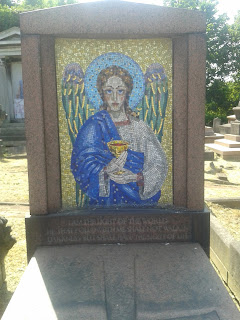Having made a visit to West Norwood Cemetery about two weeks ago in glorious sunshine, I followed the Curious Art trail, of which Chris McCabe's Clotted Sun project is part. It was a wonderful forage through the overgrown labyrinth of this remarkably serene, unspoiled trove of Gothic Victoriana, which some of the installations provided startling new perspectives on. (Others, it must be said, added little to the memorials or the green spaces of the cemetery.)
However, Chris's trail of deceased poets seemed under-represented, showing itself only in the anthology of the 12 writers he has deposited in the eerily moving store-house for cinerary urns, the Columbarium (beautiful word with a beautiful etymology: originally it had the meaning of a dove-cote or pigeon-house but - because it also included many small "pigeon-holes" - came by extension to denote the reliquary-room for such urns.)
I commented about this on Chris's blog and since others had apparently said the same, he offered to conduct a tour of his site-trail linking the twelve forgotten poets. Colin Fenn, head of the Friends of West Norwood Cemetery and custodian of a history as intricate and convoluted as the graveyard itself, would assist.
The tour went ahead last Thursday, with Chris's diligent research (partly from the Poetry Library, where he works) and poem-readings offset and contextualised by Colin's amazingly detailed factual knowledge of the cemetery and its other noteworthy occupants. He told us, for example, that in Victorian times West Norwood was thought of as "the millionaire's cemetery", which explains the preponderance of large-scale, grandiloquent monuments and mausolea here, often giving it the feel of a necropolis, a microcosmic conurbation resisting the flux of the bigger, noisier city which surrounds it.
Such thoughts keyed in with one of the themes of Chris's project, which is to explore the concept of posterity in regarding poets and their works: by what criteria do certain poets survive and endure, their books lasting centuries after their own deaths, whilst other writers - even those perhaps celebrated and widely-read in their own lifetimes - become as forgotten as these twelve whom Chris has painstakingly unearthed? What meaning can posterity possess within our increasingly attention-deficited,digitised world where the physical entities of books themselves are beginning to be superseded and our memory-spans - rendered jittery by a constant drip-feed of subsidiary data - can hardly stretch to recalling what we read this morning, let alone memorising whole poems, as was common practice until comparatively recently?
The desire to attain the "immortality" of posthumous renown is a consistent theme throughout the history of poetry, of course, Shakespeare's Sonnets providing only the most obvious locus. From a liberal-humanist perspective, the giftedness or "genius" of the poet was usually thought to be the guarantor of a poem or volume's longevity but a more nuanced reading might question whether other factors weren't in operation: gender, class, ethnicity and political/religious affiliations are clearly recurrent issues impacting on both the publication and readership of poetry, as indeed they remain now. Even Gray's 'Elegy In a Country Churchyard' from 1742, ambivalent within its orderly Augustan stanzas, flags up the link between "Penury" and the obscure, unpublished status of a dead poet - the "mute inglorious Milton" I alluded to in my previous West Norwood post.
A nice example arose when Chris and Colin directed us to the grave of Menella Bute Smedley, the only female poet of the twelve although in terms of the quality of her writing, perhaps one of the more noteworthy. Her grave was actually obscured by brambles and undergrowth and the poem-stone that Chris had given her was just visible in the grass, fittingly inscribed: SUN UNSEEN.
A further resonant irony around the theme of permanence and memorialising was that in several cases the poem-stones that Chris had laid at the beginning of the summer had already migrated or in some cases gone missing: perhaps dislodged by a mower or even taken home by a curious child. Our party was at times engaged in a heads-down search among the grass of a particular area, as though for a lost purse. As Colin suggested, and as the tilting, crumbling, subsiding state of many of the headstones attested to, "Stones can be ephemeral".
The final poet of the tour was Theodore Watts-Dunton, more famous for taming the wilder proclivities of Swinburne than for his own writings. Synchronicities often suggest the presence of energies that persist and can influence us: the next day I was rushing through Putney on my way to an appointment when absolutely by chance I came across The Pines, which Chris had mentioned, a large house with its blue plaque commemorating that it had been the home of Watts-Dunton and Swinburne.
Thanks to Chris and to Colin for the tour. I've just realised that today (28th July) is the last day that the Curious Trail is up so if you haven't seen it go and take a look.
I hope that Chris's poem-stones endure a little longer.

















